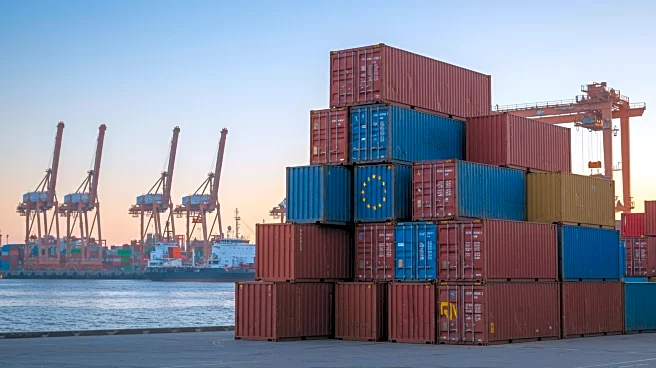What is the story about?
What's Happening?
European parcel companies, including DHL, Royal Mail, and national post offices in France and Spain, have temporarily halted some shipments to the United States. This suspension is in response to new U.S. tariff policies that eliminate the 'de minimis' rule, which previously allowed packages valued under $800 to enter the U.S. duty-free. The rule change, effective August 29, follows an executive order from President Trump and affects all countries, having already been applied to China and Hong Kong. While letters and gifts under $100 remain exempt, business shipments face significant disruption. The suspension is primarily due to unresolved questions about customs duties collection, required data, and data transmission to U.S. Customs and Border Protection. DHL Group has paused business shipments through Deutsche Post and DHL Parcel Germany, though DHL Express remains available. The French postal service La Poste and Spain's Correos have also suspended shipments, citing the need for further clarification and the short timeframe for implementation.
Why It's Important?
The suspension of shipments by European shippers highlights the complexities and potential disruptions caused by changes in international trade policies. The elimination of the 'de minimis' rule could increase costs for imported goods, affecting businesses and consumers who rely on affordable international shipping. The policy change aims to close what the White House describes as a 'catastrophic loophole' that reduces tariff revenue and potentially allows illicit goods to enter the U.S. However, critics argue that the move could disproportionately impact poorer Americans and create administrative challenges for logistics companies. The situation underscores the broader implications of trade policy shifts on global supply chains and international commerce.
What's Next?
European postal services are working to adapt to the new U.S. tariff rules, with some, like the Royal Mail, predicting only brief disruptions as they establish new systems for calculating and invoicing tariffs. DHL aims to resume postal goods shipping to the U.S. as soon as possible, though no specific timeline has been provided. The ongoing adjustments by logistics companies and postal services will be crucial in determining the long-term impact of the policy change on international shipping and trade. Stakeholders, including businesses and policymakers, will likely continue to monitor and respond to the evolving situation.
Beyond the Headlines
The policy change reflects a broader trend of increasing scrutiny and regulation of international trade practices. The bipartisan support for restricting 'de minimis' shipments indicates a growing concern over the balance between facilitating trade and ensuring security and fairness in the market. The debate over the rule's elimination also touches on issues of economic equity, as some argue it could disadvantage lower-income consumers who benefit from duty-free imports. The situation may prompt further discussions on how to balance trade facilitation with regulatory oversight.















